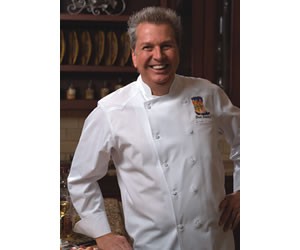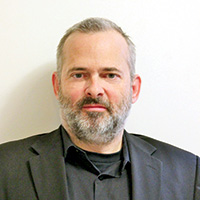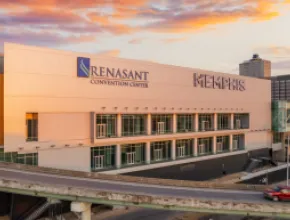What does it take to shine in the Lone Star State, where larger than life is the baseline?
The Texas character is impenetrably proud and independent—"Texan first, then American" is an old school refrain—but Texans are far from guarded, selfish or unwelcoming. Quite the opposite in fact: There is always room here for outsiders with a story to tell, a quest to fulfill or a mission to accomplish, and oftentimes it is through their experiences and successes that the story of making it in Texas—the state that pioneered pioneering—is most clearly told.
Dean Fearing
A classic example is Kentucky-born Dean Fearing, a charter member of the gang of rebel chefs (dubbed the "Texas Mafia" at the time) who hit Texas three decades ago and ignited the flavor-blazed revolution that became known as Southwestern cuisine. The son of an innkeeper working for Holiday Inn, Fearing bounced around the Midwest growing up, working in hotel kitchens at the behest of his father.
After graduating from the Culinary Institute of America and a stint at Cincinnati’s five-star La Maisonette, he moved to Dallas in 1978 to work at the Fairmont Hotel’s Pyramid Room. Arriving with "eyes wide open," Fearing saw nothing but opportunity and was especially drawn to the spirit of openness.
"I expected this rough gun-toting place, but instead found a growing city that I knew I was going to grow with," he says. "Then as now, Texas is a place where you can talk to people and stake your claim. There is no caste system here."
Following stints including his legendary run as head chef at The Mansion on Turtle Creek, Fearing went eponymous at Uptown’s Ritz-Carlton Hotel in 2007. Celebrating its third anniversary in 2010, Fearing’s is one reason people come to Dallas, and the Southwestern cuisine that he played a pivotal role in creating is now enmeshed in the Texas identity.
"Twenty percent of my customers are from New York, and 90 percent of them ask when I’m coming to Manhattan," says Fearing, who is unambiguous in his response. "The real deal is here in Texas."
Pam Minick
Another transplant who celebrates the spirit of openness in Texas is Pam Minick. Originally from Las Vegas, she first gained fame as a teenager when she was crowned Miss Rodeo America. She would go on to become one of rodeo’s most distinctive personalities, both as an award-winning competitor and in her career as a rodeo, equestrian and country music broadcaster. Among her many achievements: movie appearances such as The Sacketts with Tom Selleck, and in 2000, induction into the National Cowgirl Hall of Fame.
Her first Texas visit (to Fort Worth) was a revelation.
"I felt such a connection, like I was born to live here," she recalls.
Rodeo was part of the hook—Fort Worth is a mecca for the sport—and in 1982, she came to Fort Worth to stay. Soon after arriving, she met her husband-to-be Billy Minick outside the then recently opened Billy Bob’s Texas in the Fort Worth Stockyards. Today, Minick serves as marketing director of the famed night club, while her husband is part-owner and general manager.
To shine in Texas, she says, means being authentic and staying true—qualities that she says define the Texas visitor experience.
"When you are competing for tourism dollars, you cannot be vanilla—unique and authentic are what count," she says.
Guy Forsyth
Austin-based musician Guy Forsyth offers a compelling muse on the Texas spirit of unity.
"Think about the environmental conditions that early settlers had to encounter here," he says. "Must have been hell in Texas, spikes at every level—but maybe competing with the harsh environment was what got people to bond together."
Born in Colorado, Forsyth spent his childhood summers visiting relatives in Houston. At age 21 he came to Austin to realize his artistic dreams.
"Austin is graduate school for musicians," he says. "I knew I had to come here if I really wanted to learn how to play. And it’s a very human-sized city that does a great job of preserving its authenticity and originality."
A self-described American roots musician and songwriter, Forsyth is a multifaceted talent, covering a spectrum of styles from blues and jazz to folk, funk and rock.
For Forsyth, who has shared the stage with the likes of BB King, Ray Charles, Lucinda Williams and Robert Cray, the Texas environment is anything but harsh.
"Back to those frontier days again—a land of empty spaces and infinite skies—Texas is a place to bring dreams to life on your own terms," he says.
Stephan Pyles
In 1996, Texas Monthly triumphantly proclaimed "Texas Food Conquers the World!" This culinary yee-haw was well justified, for this was when cilantro, chiles and mole sauce were igniting the U.S. and international culinary scene. Fearing, of course, is prominently mentioned in the article, and he jokingly says today that if he is the patriarch of Southwestern cuisine, then Stephan Pyles, another original member of the gang of rebel chefs, is its grandfather.
A fifth-generation Texan just three years older than Fearing, Pyles certainly owns the deeper roots. Destined to be anointed "an absolute genius" by the New York Times and credited by Bon Appetit with "almost single-handedly changing the cooking scene in Texas," Pyles was raised in West Texas, where he worked in his family’s restaurant, the Big Spring Truck-Stop Cafe. Quoted in another Texas Monthly story from 1996, he said, "When I was 7 or 8, I wanted to be a cook. What a cool job, I thought, to work in a floppy hat and a dirty apron with a cigarette hanging out of your mouth."
In a subsequent career that has included cooking for kings and queens, Pyles is culinary royalty, his serene manner and sparkling Texas eyes hardly the image of his romantic dirty-aproned scamp. Having created 16 restaurants in four cities over the past three decades, what is Pyles’ encore after conquering the world?
"Texan pride is bred in the bone," he says, "and my greatest reward now is being an ambassador on behalf of Texas and the cuisine that we created."
Chloe Dao
Around the time that Pyles and his fellow bandits started flipping boring old continental cuisine on its head, Chloe Dao was beginning a new life in Texas half a world away from her native Laos. Driven by circumstance, Dao, her parents and her seven sisters landed in Houston in 1979.
Barely speaking English, her mother set up shop in a local flea market. At the time, it might have seemed impossible that 27 years later, in 2006, Chloe would go on to win Bravo’s Emmy-nominated Project Runway and continue her rise as a nationally acclaimed fashion designer. Dao credits the Texan "culture of acceptance" and "willingness of the community to help" with getting her family established in Houston, which then paved her way to success.
"We were never looked down upon," she says. "It is in the nature of Texans to over-extend themselves to strangers and to people in need."
After schooling and training in New York, she returned to Texas to realize her dream of opening her own boutique. Opened in 2000, Lot 8—named for Dao and her seven sisters—was one of many milestones in her luminary career.
"In Texas, you can create something from nothing," Dao says. "I trained in New York, but it was in Texas that my dreams came true."
Kent Rathbun
Though not part of the original Southwestern cuisine revolution, Kent Rathbun, a Kansas City native whose 20-plus years in Dallas include working for Fearing as a sous chef at The Mansion at Turtle Creek, has more than made up for lost time. With six Texas restaurants to his name, including the acclaimed Abacus in Dallas and a trio of Jasper’s (a seventh restaurant, Shinsei, is jointly owned by his wife Tracy and Fearing’s wife Lynae), Iron Chef winner Rathbun has earned his rightful place in Texas culinary lore while also thriving in the national eye.
His continuing joy in his craft is typical of today’s Texas celebrity chef, finding a direct translation to the table and the guest experience. The essence of Texas cuisine, in his view, is not how the food looks on the plate but how it tastes.
"Between DFW Airport and our central location in the U.S., our ability to access produce from around the globe has made Texas a better food state," says Rathbun, who claims many "discriminating palates among his savvy, well-traveled clientele."
Also a food ambassador on behalf of the Dallas CVB, Rathbun has one note of reservation, however.
"Things are improving, but the perception of Texas cuisine as just Tex-Mex and barbeque persists to this day," he says.
For Texas, the land of infinite skies and possibilities, that sounds like just another challenge masquerading as an opportunity.







